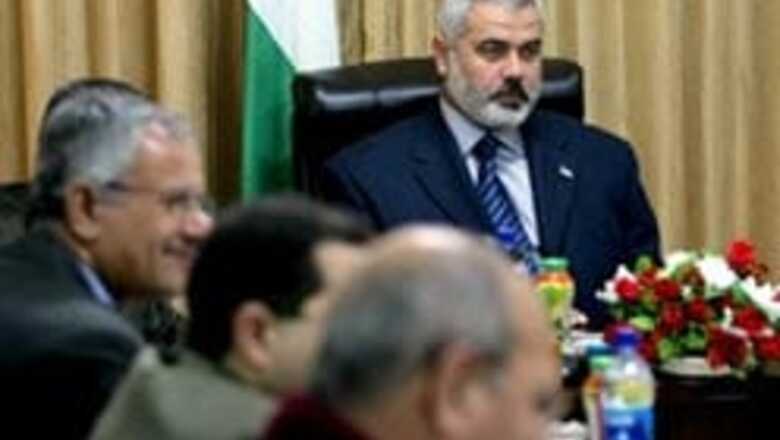
views
Gaza City: The Hamas Cabinet resigned on Thursday to make way for a coalition with the rival Fatah of moderate Palestinian President Mahmoud Abbas, who gave his blessing despite what his aides said was a warning by the US that Washington would shun the new coalition.
Abbas presided over a brief ceremony in which Prime Minister Ismail Haniyeh of Hamas submitted the resignation of his Cabinet, ending months of stop-and-go power-sharing negotiations.
Abbas then asked Haniyeh, as head of a caretaker government, to form a Hamas-Fatah coalition within five weeks. In his letter of appointment, Abbas said the new government must ''respect'' international agreements, a wording that implies acceptance of Israel but falls short of international demands of an explicit recognition.
In Washington, US State Department spokesman, Sean McCormack would not confirm the report of a possible US boycott, saying only that the US will not judge a Palestinian government until it has been formed, and that its performance would be reviewed.
The international demands have put Abbas in a difficult bind. Had he pulled out of the deal with Hamas, he could have been branded a traitor by his people, become increasingly ineffective and triggered more factional fighting. Since May, more than 130 Palestinians have been killed in Fatah-Hamas clashes.
In moving forward with the new partnership, Abbas will likely deepen the Palestinians' isolation.
Abbas had been trying for months to form a coalition between Hamas and Fatah, in hopes such a coalition could persuade the West to end its crippling aid boycott of the Hamas-led government.
Last week, in power-sharing talks hosted by Saudi Arabia, he was unable to wrest a clear commitment from Hamas that it will recognize Israel. Instead, he had to settle for the vague promise that Hamas will ''respect'' previous peace deals with the Jewish state, implying recognition.
In response, the US and Israel said only that they expect a Palestinian government to meet the international demands. Palestinian officials had tried to put a positive spin on Washington's silence.
However, on Wednesday evening, Abbas received a phone call from US Assistant Secretary of State David Welch, who said the new government's platform was not satisfactory, said Abbas aides, speaking on condition of anonymity because they were not authorized to discuss the issue.
Welch said the US would not deal with any members of the new government, including those from Fatah and independents, the aides said.
Jacob Walles, the US consul general in Jerusalem, then delivered the same message to Abbas in person in a meeting at his headquarters in the West Bank town of Ramallah on Thursday, they said. The mood at the headquarters, known as the mukataa, was tense and Abbas' advisers said they were worried about the future.
Stacy Barrios, a spokeswoman for the consulate, confirmed that the meeting took place but would not disclose details of the talks.
Asked about the emerging coalition, McCormack said: ''All the questions with respect to a prospective national unity government are hypothetical because there are many essential blanks yet to be filled: The composition of the government, the platform of the government.''
Abbas also learned earlier this week that Israel had decided on a boycott, said his aides. The message was delivered in a meeting between Palestinian negotiators and aides of Israeli PrimeMinister Ehud Olmert, the Palestinians said.
Speaking to Turkish television Thursday, during a trip to Turkey, Olmert said, ''I am not certain the full scope of this agreement is clear to anyone. The initial signs are not very encouraging.''















Comments
0 comment